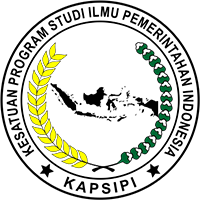Mainstreaming Agile Governance through the SiBakul Jogja Apps during the COVID-19 Pandemic
DOI:
https://doi.org/10.35967/njip.v22i1.395Keywords:
Sibakul Jogja, MSMEs, Innovation, Agile GovernanceAbstract
The COVID-19 pandemic has affected various sectors, one of which is the economic sector, which includes MSMEs. Government innovation is needed to bridge MSMEs so they can survive amid the COVID-19 Pandemic crisis, one of which is through the SiBakul Jogja platform. The purpose of this study is to examine the implementation of the SiBakul Jogja platform through an agile governance perspective as an innovation from the DIY Provincial Government. The research method used is a qualitative case study approach. Data collection techniques with triangulation, namely interviews and documentation. The results of the study show that SiBakul Jogja has a system that reflects the application of Agile Governance as one of the DIY UKM Diskop innovations. Some of them are Business Driven which were developed concurrently with system updates related to the Systematic and adaptive approach. However, SiBakul Jogja still has weaknesses in terms of responsiveness from public complaints, especially in the SiBakul Jogja system which is related to Human Focused. Through its various features to facilitate KUMKM data integration, in fact not all features can function optimally. In fact, one of its features, namely MarketHub and the Kotagede YIA Market Gallery, has high traffic because it is close to people's needs. The conclusion of this study illustrates that SiBakul Jogja as a Government innovation has not been fully capable of implementing agile governance.
Downloads
References
Al-hamdi, R., Sakir, Suswanta, Atmojo, M. eko, & Efendi, D. (2020). Penelitian Kualitatif: pegangan Mahasiswa Ilmu Pemerintahan (Queena Ns (ed.); 1st ed.). Pustaka pelajar.
Alfin, A. (2021). Analisis Strategi UMKM dala Menghadapi Krisis di Era Pandemi Covid-19. Jurnal Inovasi Penelitian, 1(8).
Bahtiar, R. A. (2021). Dampak Pandemi covid-19 terhadap Sektor Usaha Mikro, Kecil dan Menengah Serta Solusinya. Kajian Singkat Tehadap Isu Aktual Dan Strategis, 8(10), 19024.
bps.go.id. (2020). Analisis Dampak Pandemi covid-19 terhadap Pelaku Usaha. Https://Covid-19.Bps.Go.Id/. https://doi.org/978-602-438-350-3
Elu, A., Yuwono, T., Yuningsih, T., & Afrizal, T. (2021). Partisipasi Masyarakat Dalam Implementasi Kebijakan Desentralisasi Administratif di Sub Distrik Pante-Makassar. Journal of Education, Humaniora and Social Sciences (JEHSS), 4(2), 968–973. https://doi.org/10.34007/jehss.v4i2.781
Evani, fuska sani. (2020). Dampak Covid-19, Pendapatan UMKM di DIY Turun 80%. Beritasatu.Com. https://www.beritasatu.com/nasional/655435/dampak-covid19-pendapatan-umkm-di-diy-turun-80
Farikhah, M. T. R. (2020). Implementation of Smart Governance Concept Policy in Bantul Regency. Nakhoda: Jurnal Ilmu Pemerintahan, 18(2), 129. https://doi.org/10.35967/jipn.v18i2.7809
Fridayani, H. D., & Chiang, L. C. (2022). Strengthening the Capacity of Government Apparatus Resources in Supporting Micro Enterprises to “Go Digital” in the Special Region of Yogyakarta. European Journal of Humanities and Social Sciences, 2(2), 25–35. https://doi.org/10.24018/ejsocial.2022.2.2.230
Hadawiya, R., Muda, I., & Batubara, B. M. (2021). Partisipasi Masyarakat dalam Musyawarah Perencanaan Pembangunan Desa Community Participation in Village Development Planning Deliberation. 3(September), 192–200. https://doi.org/10.31289/strukturasi.v3i2.749
Hulu, V. A., Patuninno, T. R., Puspasari, D., Juniyanto, N., & Pramudita, L. T. A. (2020). Menggagas Revolusi Mental Birokrasi Melalui Konsep Competitive Agile Leadership. Ministrate: Jurnal Birokrasi Dan Pemerintahan Daerah, 2(1), 29–37. https://doi.org/10.15575/jbpd.v2i1.8050
Husa, M. A. (2020). Sudah 400 UMKM Tergabung dalam SiBakul Jogja. Jogja.Tribunnews.Com. https://jogja.tribunnews.com/2020/07/21/sudah-400-umkm-tergabung-dalam-sibakul-jogja
Kemenkopukm.go.id. (2021). Kemenkopukm Susun 6 Indikator Strategis Adaptasi Dan Trandformasi KUMKM. Kemenkopukm.Go.Id. https://kemenkopukm.go.id/read/kemenkopukm-susun-6-indikator-strategis-adaptasi-dan-transformasi-kumkm
Kurniawan, D. I., Maulana, A., Studi, P., & Pemerintahan, I. (2020). Agile governance sebagai Bentuk Transformasi Bentuk Pemerintah Daerah.
Lisongwei, L. (2023). Innovative Human Resource Management Strategies During the Covid-19 Pandemic: Telecommuting Practice. JIIP - Jurnal Ilmiah Ilmu Pendidikan, 6(1), 85–89. https://doi.org/10.54371/jiip.v6i1.1391
Luna, A. J. H. D. O., Kruchten, P., & Mora, H. P. de. (2015). Agile Governance Theory?: conceptual development. 12th Internatioal Conference on Management of Technology and Information System, 1–22.
Melinda, M., Syamsurizaldi, S., & Kabullah, M. I. (2020). Innovation of Online Population Administrative Services (PADUKO) by The Department of Population and Civil Registration of Padang Panjang City. Nakhoda: Jurnal Ilmu Pemerintahan, 19(2), 202–216. https://doi.org/10.35967/njip.v19i2.115
Mulyanto, D. H. (2020). The Quality In Electronic Services Jogja City Government: In Case E-KTP. Nakhoda: Jurnal Ilmu Pemerintahan, 18(2), 104. https://doi.org/10.35967/jipn.v18i2.7814
Pertiwi, A. I., & Darumurti, A. (2021). Collaborative Governance in Empowering Micro, Small, and Medium Enterprises Through Sibakul Jogja free-Ongkir During Covid-19. Jurnal Studi Sosial Dan Politik, 5(1), 49–65.
Prabandari, D. S., & Atmojo, M. E. (2022). Implementasi Platfrom Sibakul Jogja Dalam Pemberdayaan Umkm Terdampak Pandemi Covid-19 Di Daerah Istimewa Yogyakarta. TheJournalish: Social and Government, 3(3), 170–181. https://doi.org/10.55314/tsg.v3i3.270
Rivelino, R. (2022). Development of Agile Governance-Based Civil Service Police Unit Organization in DKI Jakarta Province. Journal of Digitainability, Realism & Mastery (DREAM), 1(02), 27–41. https://doi.org/10.56982/journalo.v1i02.18
Saksono, H. (2020). INNOVATION HUB?: MEDIA KOLABORASI MENUJU PEMERINTAHAN DAERAH INOVATIF. Nakhoda: Jurnal Ilmu Pemerintahan, 19(1), 1–16.
Sari, Y. I. (2020). Sisi Terang Pandemi COVID-19. Jurnal Ilmiah Hubungan Internasional, 89–94. https://doi.org/10.26593/JIHI.V0I0.3878.89-94
Sugiyono. (2019). Metode Penelitian Kualitatif Kuantitatif (Sutopo (ed.); 1st ed.). ALFABETA.
Suluh, D., Dewi, K., Yulianti, D. B., & Yusdiawan, I. A. (2022). An Analysis of Barriers to E-government. Nakhoda: Jurnal Ilmu Pemerintahan, 21(1), 95–106. https://doi.org/10.35967/njip.v21i1.336
Sumampouw, W., Kurnia, K., & Arrobi, I. R. (2021). Perlindungan Hukum terhadap Usaha Mikro Kecil dan Menengah Pasca Berlakunya Undang-Undang Cipta Kerja. Jurnal De Jure, 13(11), 24–39.
Vernanda, R. (2019). Kesiapan Indonesia Menuju Agile Governance. Konferensi Nasional Ilmu Administrasi, 1–6.
Zahra, N. S. A., Suparman, N., & Alia, S. (2022). PENERAPAN PRINSIP AGILE GOVERNANCE DALAM PELAYANAN PUBLIK PADA DINAS KEPENDUDUKAN DAN PENCATATAN SIPIL KOTA BANDUNG. Jurnal Inovasi Penelitian, 3(5), 6167–6178.
Zulyani, E. P., & Meiwanda, G. (2020). Agile Government dalam Mewujudkan Birokrasi yang Berkelas Dunia. Spirit Publik: Jurnal Administrasi Publik, 15(1), 78. https://doi.org/10.20961/sp.v15i1.40717
Downloads
Published
How to Cite
Issue
Section
License
Copyright (c) 2023 Authos(s)

This work is licensed under a Creative Commons Attribution-NonCommercial-ShareAlike 4.0 International License.





